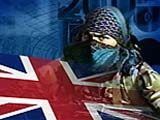
Dozens of Islamic terrorists who have finished their prison sentences are so dangerous that a secret list of restrictions has been drawn up to limit their freedom, it has been disclosed.
The curbs have been introduced by ministers who are concerned about the release or impending release of a ‘significant’ number of extremists.
Restrictions are understood to include a ban on using computers, visiting certain mosques, associating with imams who are not approved by the Government and not associating with known criminals.
Ministers will apply the curbs to at least 20 convicted terrorists who have been freed from jail this year as well as 26 eligible for release within the next two years.
One of those recently eligible to be freed is Abu Bakr Mansha, who was jailed for plotting to kill a British soldier.
Probation officers have been given a catalogue of restrictions that can apply to terrorists freed on licence.
The restricted document, has been drafted by the Ministry of Justice and is entitled, The Management of Critical Public Protection Cases and Terrorist or Terrorist Related Offenders.
It states: ‘There is now a small but significant number of terrorists being held in custody or managed on licence.
‘This instruction ensures that processes to manage offenders who pose a risk of harm to the public or whose cases pose complex management issues are effectively configured to meet the challenges of managing terrorist offenders.’
Some estimates show there are more than 100 convicted Islamic terrorists in the UK prison system.
But according to the Royal United Services Institute, 800 Muslims have been radicalised while in prison and could present a danger to the public when they are released.
Among those eligible to be freed over the past two years was Khalid Khaliq, who associated with the 7/7 bombers and was jailed for possessing documents useful for terrorism.
The document also expresses concern that released terrorists may try to seek work which puts them in contact with people who may be vulnerable to their ideas.
It states: ‘Some released offenders may express an interest in working in the field of “deradicalisation” or in other roles which may involve direct or indirect contact with vulnerable individuals.’
Like other offenders, terrorists are considered for release after carrying out half of their sentence. When they are freed, they are put on licence, which means that they must return to jail if they break certain restrictions.
The document, leaked to the Daily Telegraph, also warns probation officers not to become targets of manipulation when dealing with terrorist offenders.
It states: ‘[They] have been known to use techniques of collusion, manipulation and duress in their relationships with front line staff. Offender managers’ potential influence on release dates could theoretically make them targets for coercion of various kinds.’
The Ministry of Justice said: ‘It is entirely right and proper that the National Offender Management Service puts in place appropriate and robust licence conditions for those released under probation supervision, particularly serious and violent offenders.
The curbs have been introduced by ministers who are concerned about the release or impending release of a ‘significant’ number of extremists.
Restrictions are understood to include a ban on using computers, visiting certain mosques, associating with imams who are not approved by the Government and not associating with known criminals.
Ministers will apply the curbs to at least 20 convicted terrorists who have been freed from jail this year as well as 26 eligible for release within the next two years.
One of those recently eligible to be freed is Abu Bakr Mansha, who was jailed for plotting to kill a British soldier.
Probation officers have been given a catalogue of restrictions that can apply to terrorists freed on licence.
The restricted document, has been drafted by the Ministry of Justice and is entitled, The Management of Critical Public Protection Cases and Terrorist or Terrorist Related Offenders.
It states: ‘There is now a small but significant number of terrorists being held in custody or managed on licence.
‘This instruction ensures that processes to manage offenders who pose a risk of harm to the public or whose cases pose complex management issues are effectively configured to meet the challenges of managing terrorist offenders.’
Some estimates show there are more than 100 convicted Islamic terrorists in the UK prison system.
But according to the Royal United Services Institute, 800 Muslims have been radicalised while in prison and could present a danger to the public when they are released.
Among those eligible to be freed over the past two years was Khalid Khaliq, who associated with the 7/7 bombers and was jailed for possessing documents useful for terrorism.
The document also expresses concern that released terrorists may try to seek work which puts them in contact with people who may be vulnerable to their ideas.
It states: ‘Some released offenders may express an interest in working in the field of “deradicalisation” or in other roles which may involve direct or indirect contact with vulnerable individuals.’
Like other offenders, terrorists are considered for release after carrying out half of their sentence. When they are freed, they are put on licence, which means that they must return to jail if they break certain restrictions.
The document, leaked to the Daily Telegraph, also warns probation officers not to become targets of manipulation when dealing with terrorist offenders.
It states: ‘[They] have been known to use techniques of collusion, manipulation and duress in their relationships with front line staff. Offender managers’ potential influence on release dates could theoretically make them targets for coercion of various kinds.’
The Ministry of Justice said: ‘It is entirely right and proper that the National Offender Management Service puts in place appropriate and robust licence conditions for those released under probation supervision, particularly serious and violent offenders.
No comments:
Post a Comment